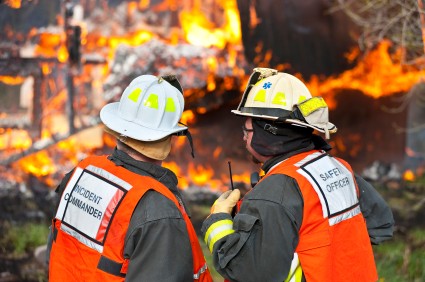[vc_row][vc_column width=”1/3″][vc_single_image image=”1407″ css_animation=”left-to-right” img_link_target=”_self” img_size=”full”][dt_gap height=”20″][/vc_column][vc_column width=”2/3″][vc_column_text]
Preventing and Minimizing Fires in Your Home
I personally had an experience at my home a few years ago with a small fire that could have been disastrous. A candle up on a pedestal was not extinguished before going to bed and the candle in the glass container burned to just liquid and broke the glass spilling the hot candle fluid on top of the table cloth starting a big fire. Luckily our fire alarm worked very quickly and let us know where the fire was. I grabbed the fire extinguisher in the bedroom and ran out with the flames shooting to the ceiling. I snuffed the fire out quickly by covering it with a nice tablecloth (cheaper than a new home) my backup was the extinguisher. The only damage we had was a little suet on the ceiling. My dry natural Christmas tree was only a few feet away from the fire. This was a very good lesson to put out all candles, make sure the natural Christmas tree is kept moist and last but not least we have for the most part changed to battery operated candles.
Below is a list of items that I feel are really important and hope you find this useful.
These are many of the things you can do to prevent or mitigate a fire in your home:
- First, be sure to have a working fire extinguisher and a working smoke detector in every room.
- Always have a fire escape plan and rehearse it periodically.
- Keep cooking surfaces clear.
- When cooking on a stove, especially gas or propane stoves, be very careful of a grease fire. On a grease fire do not try to put out with water! Use fire extinguisher or smother with some kind of cover. When cooking never leave your post
- Barbecues or turkey cookers should be kept away from the home.
- Keep lint trap clean in your clothes dryer.
- Clean the lint out of the dryer vent and piping to the outside.
- If your furnace is squealing, the fan motor may have a worn out bearing and this can cause a friction fire.
- Keep combustibles away from fireplaces, furnace and wall heaters.
- Install a chimney cap spark arrestor.
- Keep all chimneys clean of suet to prevent a deadly chimney fire. Clean every two years or depending on use. Use dry wood which will cause the fire to burn hotter and keep the suet buildup to a minimum. Check in the attic to make sure there is no framing wood close to the chimney.
- If the man of the house or whoever smokes a pipe goes outside to smoke make sure the pipe is not put inside a pocket of the coat.
- Make sure you have a good fireplace screen to keep sparks from catching the carpet on fire.
- One of the major causes of a home fire is faulty wiring. Test your wiring or have a professional licensed electrician look at your wiring. Regulations are always changing, so your home may be legal, but not up to code. If you have aluminum wire (common in construction in the early 70′s), that could cause fires. It’s an inexpensive fix, pig-tailing junctions with copper wire. Be sure your breaker box is up to code, too.
- Clear all debris and dried vegetation well away from the house, especially if you are in a forested or open space area.
- Make sure that your gas water heater in the garage is off the floor so that if there is gas or propane fumes, present in a closed garage, there will not be an explosion. Better yet do not store any gas or propane in a garage with a gas furnace or water heater.
- Leave the house wiring to the professionals as in the long run this may prevent a fire.
- For a gas furnace or water heater, install a heavy duty safety bumper high enough for a car bumper to stop a vehicle from running into the gas line or the appliance.
- Do not leave old stain or paint rags in a container in your garage or basement. These rags in a container have a low combustion point and can easily heat up and catch fire.
- Use non-combustible materials for exteriors whenever possible. Cedar roofs in a very hot and dry climate are a fire hazard.
- Consider interior sprinklers if building a new home. New national fire codes may soon mandate sprinklers in all new homes and maybe even resold homes. Many commercial buildings require sprinklers
- Follow safety warnings on power strips, extension cords, portable heaters, electric blankets and other electric appliances.
- Install the recommended bulb wattage in light fixtures.
- Make sure your natural Christmas tree is kept moist with a water pan in the tree stand.
- Turnoff Christmas trees when you go to bed or leave home to prevent a potential electrical fire.
- Keep burning candles away from your Christmas tree.
- Never ever leave home with any candles burning. Better yet the new battery operated candles look real and are a lot safer.
- Monitored fire systems can keep a potentially disastrous fire to a minimum. These systems tell the fire department where the fire is located and also alert you to the fire location when you are home.
There’s almost nothing more frightening to a homeowner than a fire or the threat of fire. Home fires are often times caused by carelessness, shoddy workmanship, defective equipment and outdated wiring. If you or anyone that you know needs help remodeling or repairing your home please don’t hesitate to call us at 503-370-8390.
[/vc_column_text][dt_gap height=”10″][/vc_column][/vc_row]

